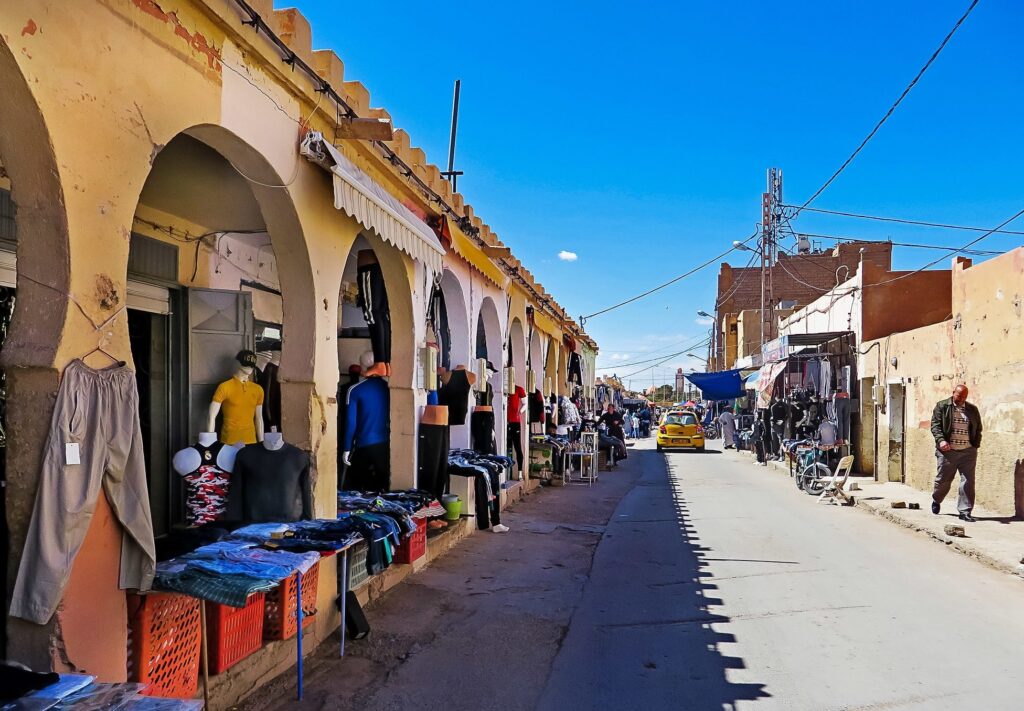Algeria is a vast country – the largest in Africa by land area. It is also a genuinely socialist state, where the government takes its contract with the population seriously.
This deep commitment forms the foundations of national policy. However, Algeria’s economy remains overwhelmingly dependent on its abundant hydrocarbons revenue.
Algeria’s size, fossil fuel wealth and social contract result in what the government terms the “democratisation of development”. This means the country’s priorities ensure that social and economic progress is evenly distributed.
Take, for example, Bechar, a town of roughly 165,000 people on the northern edge of the Sahara about 800km southwest of the capital Algiers.
Driving in from the airport, on one side of the road there lies a brand new university with a projected student body of 10,000. On the other side is a pristine school for military cadets, with kerbs crisply painted and shrubs freshly pruned.
Further down the street is a large mosque still under construction, followed by a gleaming, freshly built oncology hospital.
All homes in Bechar have running water, electricity, piped gas and internet. And while the accommodation may be far from deluxe, it is provided for free by the government.
There is not a shanty town to be seen. No stray dogs roam around. It is a remarkable achievement.
And it’s not just Bechar. Algeria’s Human Development Index is the highest of all the countries on the Mediterranean’s southern shores, from Morocco on the Atlantic Coast to Egypt on the Red Sea.
Stability and equity win over the uncertainty and inequality of the free market
Algeria’s hydrocarbons, of course, drive all of this development. The country exported 49 billion cubic metres of gas and 780,000 barrels per day of crude in 2024.
Hydrocarbons account for 14 percent of GDP, nearly half of budget revenue, and 84 percent of export revenue. Algeria’s oil and gas receipts not only fund social development but are the backbone of its economy, which is dominated by job-creating state-owned enterprises (SOEs).
These SOEs produce everything from tractors and televisions to condiments such as mayonnaise. There is some private sector commercial activity in Algeria, but SOEs overshadow it.
As with most SOEs worldwide, Algeria’s are inefficient and generally unprofitable. Consequently, they require constant refinancing from the public sector banks, which are financed by the central bank, which itself is funded by the country’s oil and gas exports.
Alas, Algeria is frequently criticised for its reliance on hydrocarbons. Critics point out that the country is vulnerable to energy price fluctuations (despite having created an oil price stabilisation fund in 2005).
Analysts argue that Algeria would be more sustainable if it diversified its economy, scaled back the role of SOEs through privatisations and increased avenues for foreign direct investment. And they are correct. Despite the immediate structural hurdles, Algeria would be better off for it in the long run.
But “better” is relative. To be sure, no Ferraris are cruising Algiers’ boulevards. There are no mega-yachts anchored along Algeria’s Mediterranean coast. There are no gleaming glass and steel skyscrapers with luxury penthouses.
But for Algeria, with its commitment to the social contract, better does not mean fancier. Somewhat “better” means more of what it is already doing. More cars for people who want a car, more homes for people who want a house, more heat in the winter, more air conditioning in the summer, more food in more pantries.
For Algeria the trade-off has always been between stable, government managed distribution of hydrocarbon receipts across the broader economy and the willy nilly, dog-eat-dog world of full blown privatisation.
The answer has consistently been a no-brainer: stability and equity win over the uncertainty and inequality of the free market every day of the week.
Years ago in a private forum, an analyst asked the then minister for investment promotion when Algeria would wind down its extensive social spending.
The minister plainly answered, “Never. The government’s social contract is sacred. We have an obligation to provide for the population.”
In this sense Algeria is something of an economic curiosity: the government is not aggressively pursuing economic diversification in the name of growth because that mode could result in more haves and fewer have nots, which Algeria is not willing to risk.
Instead, the country is opting to maintain hydrocarbons reliance while cautiously exploring avenues of economic diversification that won’t threaten to create massive socioeconomic disparities.
Geoff Porter is founder and president of North Africa Risk Consulting



